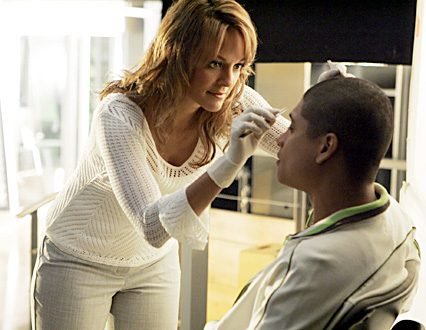
A commenter on my recent post, Jesus Said: Go Sell All That You Have and Follow Me, described me as an “all-in” type of person. I have often thought about being an all-in person. Was I always this way or did external forces turn me into that kind of person? I have rummaged through the first fifteen years of my life and concluded that I was NOT naturally an all-in kind of person. The best of example I found comes from my team sports experiences. I played Little League baseball, Pony League baseball, city league basketball, and one forgettable year of junior high football. I thoroughly enjoyed playing sports. I had enough talent to garner me a spot on teams, but my seat on the bench was usually right next to the water boy. Basketball was the only exception. I was a starter. This fact, however, shouldn’t be taken as a statement of my basketball prowess. If anything, all it says is that some of my teammates weren’t very good. I was a starter, then, on a very average team.
As I comb through my past sports experiences, one fact comes to light, regardless of the sport: I was never an all-in player. Sure, I would be at every practice and play pick-up games with neighborhood boys, but I was never the type of player who worked day and night on his skills. I enjoyed the fun and camaraderie that sports afforded me, but I was never going to be a lone gym rat, for example, shooting hundreds of shots a day to work on my foul shooting. My dad showed no interest in my athletic efforts. I don’t remember a time when he tossed the ball with me in the yard or attended one of my games. I want to think, surely, that he attended one or more of my games, but I have no recollection of him doing so. It was my grandmother who bought me my first baseball glove (and ball). I do have several memories of Grandma Rausch and my mom attending some of my Pony League games. I vividly remember hearing Grandma loudly telling the umpire while I was batting, THAT WASN’T A STRIKE! Never mind that I couldn’t have hit it even if it was. I was a terrible hitter, often used as a late-inning defensive replacement or a pinch runner (I am left-handed, and I was, in the day, a speedy base runner). I was never going to be Babe Ruth or even Mario Mendoza.
I can safely conclude, then, that I was NOT an all-in person in my younger years. However, as I turn my thoughts to my life from the time I was saved and baptized at age fifteen though my first decade in the ministry, I see a very different Bruce Gerencser. I see that once I became a Christian and declared I was called by God to be a preacher, I was all-in when it came to matters of faith. My transformation took place during the same time my parents divorced and my dad married a girl four years older than I. Yes, you read that right. She was 19. My father was 36. His new wife had given birth the previous year, leaving me wondering if the child belonged to my dad. Nonetheless, my familial circumstances greatly changed the year I got saved. My parents and siblings quit attending church, leaving me as the only Gerencser still a member of Trinity Baptist Church in Findlay, Ohio. I disconnected from my family, and directed most of my time and energy into attending church, working on a bus route, learning how to be a preacher, and running around with my church friends. The church became my family. I spent as little time at home as possible, often not coming home until it was time for bed.
During this time period, Bruce Turner, the youth pastor at Trinity, became a surrogate father of sorts. (Please read Dear Bruce Turner.) I have nothing but good things to say about Bruce. He was a real help to me at a vulnerable time in my life. That said, he was an Independent Fundamentalist Baptist (IFB) preacher, and his theology, worldview, and way of living made a deep impression me. By the time I was sixteen, I was an all-in IFB Christian — a True Believer®. When Trinity would host Ohio Baptist Bible Fellowship meetings, I would skip school so I could listen to the big-name IFB preachers of the day. Not one of my church friends joined me. I was alone when it came to a thirst for hearing these men of God. I am sure my church friends, if I asked them to comment on my younger years, would point to the changes that took place in my life after Jesus and I became best buddies. Not that I was no longer a fun-loving, humorous, girl-chasing redhead. I was, but my conduct and language changed, as did the kind of girls I was interested in. I only dated girls from the churches I attended, but after I was saved, I looked for girls who were as serious about their faith as I was. My first serious girlfriend after I was saved was the sixteen-year-old preacher’s daughter — Charlotte Brandenburg.
I was all-in with Jesus, so it made sense for me to only date girls who had similar motivations. The last girl I dated, of course, became my wife. We shared similar sentiments about spiritual matters and what it was God wanted us to do with our lives. And for the first three decades of our marriage, I was an all-in pastor, a man who demanded total commitment from himself, his family, and the churches he pastored. I had little tolerance for laziness, and I had no time for golf-playing ministerial colleagues. There were souls to save, churches to build. How could I devote one moment of time to the pleasures of the world while people still needed to hear the Evangelical gospel? Now, I don’t want to paint a picture of someone who was free from temptation and “sin.” I wasn’t, but the arc of my life was bent towards holiness, preaching the gospel, and doing all I could to help people mature in the faith. I often heard preachers talk about “balance.” For many years, I rejected calls for “balance,” choosing instead to devote most of my time and effort into the work of the ministry. Better to burn out than rust out, I proudly told myself.
As I look at the overall arch of my life, I can see how being all-in has helped me when it came to computers, photography, and writing. I tackled all three of these things without any training, choosing a path of self-education. I continue to work on knowing more about these things. I most certainly want to be a better writer and photographer. Computers? I just want the damn things to work when I push the “on” button. In other areas of my life, thanks to chronic illness and pain, I have learned to let go and let Loki. I am still learning to “not give a shit” about some things, even if all-in Bruce still wants to dive into the deep end of the pool. Maybe at age sixty-one, I am learning “balance.” Or maybe, I have learned that it is okay to not be all-in on some things; that it’s okay not to know everything about e-v-e-r-y-t-h-i-n-g.
About Bruce Gerencser
Bruce Gerencser, 61, lives in rural Northwest Ohio with his wife of 40 years. He and his wife have six grown children and twelve grandchildren. Bruce pastored Evangelical churches for twenty-five years in Ohio, Texas, and Michigan. Bruce left the ministry in 2005, and in 2008 he left Christianity. Bruce is now a humanist and an atheist. For more information about Bruce, please read the About page.
Bruce is a local photography business owner, operating Defiance County Photo out of his home. If you live in Northwest Ohio and would like to hire Bruce, please email him.
Thank you for reading this post. Please share your thoughts in the comment section. If you are a first-time commenter, please read the commenting policy before wowing readers with your words. All first-time comments are moderated. If you would like to contact Bruce directly, please use the contact form to do so.
Donations are always appreciated. Donations on a monthly basis can be made through Patreon. One-time donations can be made through PayPal.


